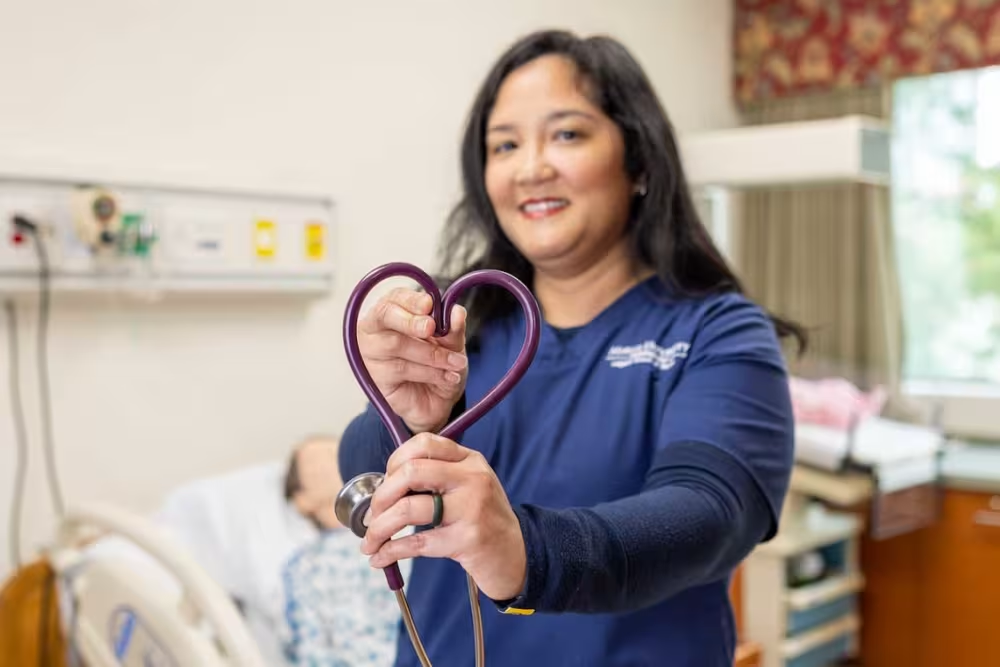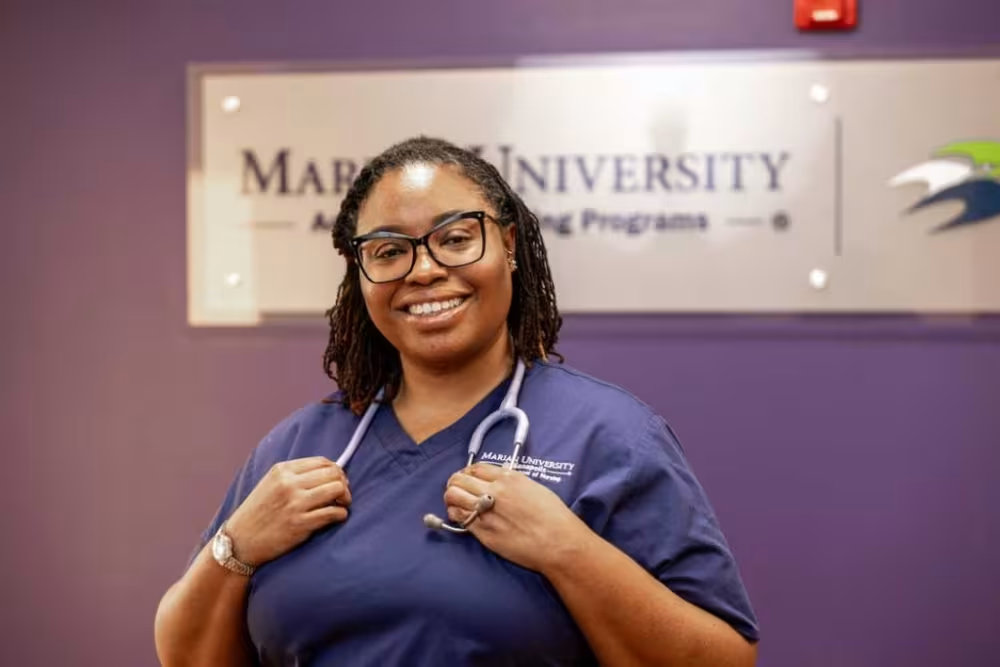What Does It Mean to Be a Nurse in Today’s Healthcare Landscape?
Each blog post is dated and contains accurate information as of that date. Certain information may have changed since the blog post publication date. If you would like to confirm the current accuracy of blog information, please visit our ABSN overview page or contact admissions at 866.892.6463.
What does it mean to be a nurse? The role of a nurse is essential, as nurses serve on the front lines of patient care and uphold the inherent dignity of each patient. What it means to be a nurse includes serving as a patient advocate and educator.

Becoming a nurse is a dream, an ambition and a calling for many. A nursing career requires initiative and constant dedication, from the challenge of earning a Bachelor of Science in Nursing (BSN) degree to carrying out daily responsibilities and patient care as a registered nurse (RN). What does it mean to be a nurse? The answer may be different for each, but nurses generally agree that this career requires fulfilling many different roles, committing to ethical practice, and ensuring inclusive care that benefits patients first and foremost.
At Marian University, our Accelerated Bachelor of Science in Nursing (ABSN) program infuses our nursing curriculum with Catholic values that teach servant leadership, nursing ethics, and respect and dignity for all. Our ABSN students embrace nursing and patient care as a higher calling.
Nurses apply their drive to care every day in each patient interaction. The public values how nurses contribute to healthcare, which is why nurses have ranked as the most trusted profession in the U.S. for over two decades.
Defining What It Means to Be a Nurse
Nurses are versatile healthcare professionals who fulfill many different patient needs in the healthcare system. They serve as nursing caregivers first and foremost, and also advocate for their patients. Nurses work to ensure that patients receive just and inclusive care and that their needs are met. They take a holistic approach to patient care, advocating on behalf of their patients’ physical, mental, social, financial, and lifestyle needs.
Nurses are also patient educators. They are responsible for ensuring that patients, as well as their families and loved ones, understand their diagnosis, know the potential benefits and risks of their treatment options and can make an informed decision. Through patient education, nurses strive to encourage patients to become active participants in their own care. Nurses also empower family caregivers to learn how to take care of their loved ones.
Furthermore, nurses are a patient’s first point of contact with their care team, performing triage and assessments. Nurses also administer treatments while carefully monitoring patient status and coordinating the efforts of the rest of the care team.
Nurses work with a hands-on, holistic approach grounded in evidence-based practice. This is equally essential in the successful treatment of patients. Nurses spend more time with patients than other care team members, so they often have a more complete picture of each patient’s condition. Nurses take patient needs and preferences into account, which helps build personal connections and rapport.
The nursing role complements other elements of patient care and ensures individuals receive the best care possible. At Marian University, our ABSN program focuses on providing a high level of compassionate care. Our students graduate prepared to step up as future nursing leaders.

Learn more about nursing values and ethics, and see how you can live them out.
Why Nursing Is More Than Just a Job
What does it mean to be a nurse? Ultimately, a nursing job is more than a list of responsibilities and daily tasks. Nurses need to remain steadfastly committed to a code of ethics because their patients depend on them.
Nurses Live Their Values Through Ethical Practice
Just as the instructors in Marian University’s 16-month ABSN program are driven to provide each student with the best nursing education possible in the academic sense, we are also dedicated to graduating practice-ready nurses with an emphasis on nursing values and ethics. Our Franciscan values align with the types of nurses we will always need more of: those who view nursing as a calling and are ready to transform lives, as well as society, through their care.
If you're thinking of going back to school for nursing, here's what you'll need to know.

Nurses Advocate for Patient Dignity and Autonomy
In reference to the holistic care that nurses deliver, respecting a patient’s dignity and seeing them on a human level is a crucial nursing value. As a nurse, you’ll care for people of all backgrounds and circumstances, which could differ radically from your own. Providing validation for each patient’s experiences and perspectives is essential. Upholding the dignity inherent in each human life during each patient interaction can make a real impact on a patient’s recovery.
Nurses Ensure Inclusive Care
Many days as a nurse can be challenging, and patients can sometimes be difficult to interact with. Despite the challenges, nurses are driven to provide the same high standard of care to everyone, regardless of background or social status. Whether they’re cooperative or not every person deserves quality, compassionate treatment when ill.
As the frontline member of each patient’s care team, you are the face of the care they receive. Demonstrating compassion for all and never letting interactions affect the quality of care is one of the most necessary parts of the nursing profession.

See how Marian University's ABSN program can help you succeed in nursing school.
Nurses Uphold the Nursing Code of Ethics
As you begin to explore the intricacies of nursing and patient care in the ABSN program, you’ll also need to become familiar with the American Nurses Association’s (ANA) Code of Ethics for Nurses. This code sets the standard for ethical nursing practice. Some of the highlights of the code include the following provisions:
- Elimination of health inequities
- Respect for the inherent dignity, worth, and unique attributes of everyone
- The advocacy of the rights, health, and safety of patients
- Self-respect through integrity and professional competence
- Advancement of the profession as a whole
When you become a practicing nurse, and even sooner as a nursing student during clinicals, it is your responsibility to ensure that your actions and words uphold the ethical code.
Why People Choose Nursing as a Career
While every nurse has their own reasons for choosing a nursing career, the following are some common ones:
- Salary: According to the U.S. Bureau of Labor Statistics (BLS), the median annual salary for RNs was $93,600 as of May 2024.
- Job growth: The BLS projects a 5% job growth rate for RNs from 2024 through 2034, faster than the average of all occupations.
- Nursing specialties: Choose from dozens of different nursing specialties in various healthcare settings, from working as a home health nurse in private homes to providing life-saving interventions in a trauma center.
- Career advancement: Opportunities for career advancement abound, especially if you earn a graduate degree in nursing. Consider pursuing career advancement as an advanced practice registered nurse (APRN), nurse administrator, nurse educator, or nurse researcher.

How to Become a Nurse
What does being a nurse mean to you? You won’t know for sure until you get started. While there are different pathways toward a nursing career, you may decide to take an accelerated approach. Whether you have a completed bachelor’s degree or just some college experience, you may be eligible to apply to Marian University’s ABSN program. We also consider transfer applicants from our own Associate of Science in Health Sciences degree program.
With the ABSN pathway, your journey to become a nurse may look like:
- Phone call with an admission advisor
- Review of your unofficial transcripts
- Completion of prerequisites
- Application to nursing school
- Completion of the BSN degree
- Passing score on the NCLEX-RN exam
- Issuance of RN license
Begin Your Nursing Journey at Marian University
What it means to be a nurse won’t be the same for every clinician, but every nurse needs to uphold a core set of nursing values. When you’re ready to begin your nursing journey as an ABSN student, Marian University is here to support you with a comprehensive curriculum and Academic Success Coaches. You could complete your education in as few as 16 months and begin to experience the role of nurses firsthand after obtaining your nursing license.
Contact an admission advisor today and take the first step toward a new career as exciting as it is rewarding.
